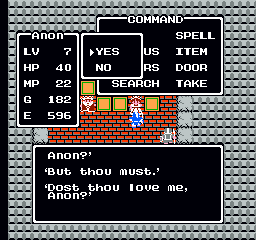Choice and Metafiction
Stacey Mason

In keeping with my recent interest in choice in narratives, I found an old Pixel Poppers article that differentiates between meaningful choices and trivial ones. What is it exactly about a choice that gives us a sense of control? Some level of choice appears in games (and hypertexts) that does not exist in cinema or a novel. But not all of these choices can be said to constitute a metanarrative.
With a movie, you can only choose whether to proceed. With a game, you choose how to proceed. Even subtle or trivial decisions, such as on what path to move your character, or which weapon to use on enemies, or where to position the camera, engage you in the creation of your own experience [… ]
Yet few would argue that Super Mario Galaxy tells a story about the player, rather than one about Mario. It presents the player with choices, but this is not enough to make it a metanarrative - a story about its own audience - any more than crossing out a character's name in a book and writing in the reader's name instead will cause the book to be a metanarrative about the reader.
So what does make a metanarrative? What must the decisions be like in order to confer narrative power, responsibility, and focus to the player? What do they have to do?
